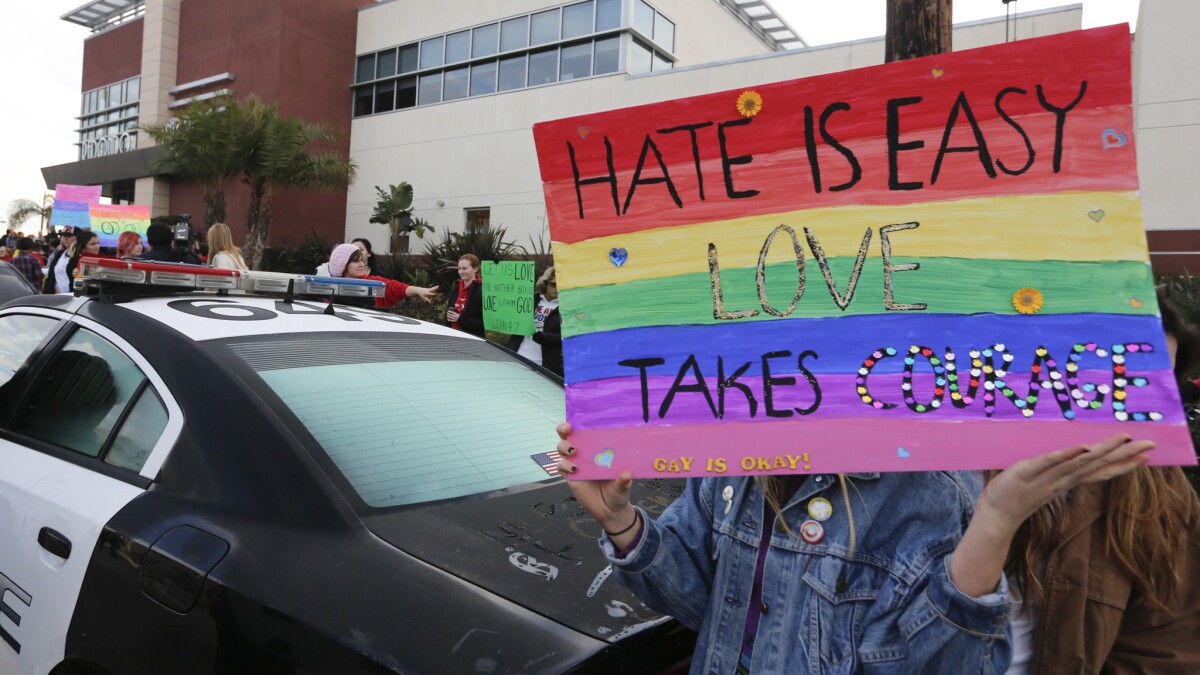Allegations of harm: Unsupportive of homosexaulity causes suicide

Throughout the fake gay marriage debate - one technique was constantly used by supporters of homosexual marriage -If you call homosexuality a sin, wrong you will cause harm to teenagers who will then suicide. The purpose of this argument is to shut down any and all opposition to the idea that homosexuality is good for society. People were abused, posters torn-down by those who pushed gay marriage. No debate No questions No arguments and if you do open your mouth you are a bigot.
There are many ways arguments can go wrong. Since the dawn of philosophy, scholars have fashioned lists of fallacies, probed suspect rhetorical devices, and teased out the troubling ways power interweaves with persuasion. These problematic properties can be wrong in a rational sense, making arguments invalid, and less likely to track truth. But they can also be wrong in an ethical sense. Argument can be deceitful, manipulative, coercive.
In the twenty-first century, there is a new challenge to argument — or rather, an old challenge gaining new life. These consist of allegations that an argument is “unhelpful,” “offensive,” “divisive,” or “harmful.” In a recently published article, I define these as “meta-argument allegations.” Such allegations consist of protestations that an arguer’s speech is wrongfully offensive or will trigger harmful consequences.
These protestations are “meta” in the sense that they do not concern the argument’s soundness. Irrespective of whether an argument is valid, its evidence important, or its conclusion true, the speech may be challenged because it is offensive, harmful, unhelpful, or divisive.

The tendency to find opponents’ arguments offensive or harmful is hardly new. Separated by millennia, Plato and John Stuart Mill both remarked on the phenomenon. Socrates himself was put to death on the charge of corrupting the Athenian youth through his impious dialogues. Yet there has been a recent surge in claims about arguments’ offensiveness and harmfulness. Contemporary movements like “cancel culture” and “callout culture” routinely invoke issues of harm and safety, as do reactions to controversial publications and tweets.
Without doubt, these types of allegations are sometimes legitimate. We all have limits on what speech we will morally tolerate, some point where we must draw the line. Yet allegations of harm and offence have several worrying properties that might caution us about their widespread use.

Allegations of harm and offence defy easy resolution. Consider the allegation that an argument will cause harm. Outside the most obvious cases, a claim about worrying knock-on social consequences will be itself very much open to debate. Indeed, speculations about likely consequences are subject to their own forms of cognitive bias. Communication theorists use the term “third-person effect” to refer to the curious human tendency to overestimate the comparative effect that persuasive communications will have on others (but not them, of course). We tend to think, “I am unmoved by this transparently foolish argument, but others are bound to fall for it.”
In fact, there are problems even in cases where we have rock solid knowledge that an argument will create harm. For one thing, contrasting political, ethical, and religious perspectives will differently weigh the moral significance of the foreseen harms, each according to their own priorities. For another, harmful knock-on consequences will often involve third parties making decisions about how to respond to the speech. Opposing perspectives will have their own views on whether responsibility for the subsequent harm lies with the original speaker or with the decisions of these third parties. These are both issues where reasonable people can disagree.
Allegations of harm and offence thus introduce new lines of dispute that are unlikely to be easily resolved. This may give us reason to think that levelling such allegations may not be a straightforward, constructive intervention. But do these considerations give us any moral reason to pause?
In fact, there are serious ethical issues in play.
Allegations of harm and offence can breach the ethical norms of argument. These “norms of argument” are principles of action that respond to the moral dimensions of argument. Commonly invoked ethical principles of argument include: principles of openness (that opposing viewpoints can be aired and must be taken seriously); relevance (that discussions should introduce considerations relevant to resolving the issue under consideration); and non-coercion (the foregoing of ulterior tactics to pressure others to agree). Living up to these principles helps us respect others as rational, autonomous people. Rather than lecturing, demanding or commanding other people, principled argument treats others as our equals, acknowledging they are capable of changing their own minds, and capable of changing ours, on the basis of shared reasons.
Yet allegations of harm and offence can breach all three of these norms. The raising of an allegation can breach openness by preventing a newly aired viewpoint being considered on its merits. The allegation can violate relevance by introducing and prioritising an entirely new topic (about offence or harmfulness). And subsequent action based on the allegation (such as de-platforming, pressuring the speaker’s employment, or hounding them through attacks in social media) can amount to a violation of the prohibition on ulterior pressure. All three of these breaches threaten to bunt us out of a consensual interaction between equals, and into a more hierarchical context where one person lays down unilateral rules for the other.
These concerns about individual ethics have a social dimension. In an environment where levelling allegations becomes common, the possibility of constructive dialogue collapses. No side wants to engage with the other when this will just provide their opponents with an opportunity to say offensive and harmful things. Equally, no side wants to broach difficult topics when it is only a matter of time before the argument is utterly derailed, and the topic of conversation once again moves to heated allegations. Once this occurs, groups will tend to talk only to like-minded fellows, contributing to problems of political “bubbles,” groupthink, and group polarisation, where doubts and contrary views are never aired, and social dynamics lead to increasingly extreme positions.
I doubt most people who engage in political or public argument desire such an outcome. They do not want a halt to genuine debate between arguers holding different opinions. What they want, I suggest, is for debate to happen, but to take place on their terms, controlled by their views of what is offensive, and constrained by their views of what is harmful. But once we realise that the very differences that make people disagree on substantive policy will — except in the most obvious cases — also lead them to disagree on matters of offence and harm, we can appreciate that this wish is fanciful.
If we value the capacity, as individuals and as a society, to get together and talk about our disagreements, then we should avoid using those very disagreements as a reason not to talk to each other.
Hugh Breakey is Senior Research Fellow in moral philosophy at Griffith University’s Institute for Ethics, Governance and Law.



